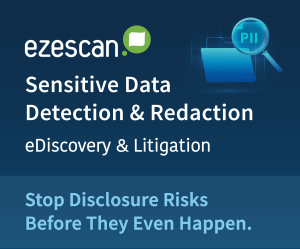How shadow AI affects law firm compliance from OneAdvanced
Artificial intelligence (AI) is rapidly reshaping the legal industry. From streamlining research to drafting documents, AI tools are increasingly integral to law firms’ operations. But what happens when lawyers and support staff start using AI outside the firm’s official systems? This unauthorised use, known as “shadow AI,” is creating significant challenges for law firm compliance and data security.
At its core, shadow AI involves employees using free or unapproved AI tools to assist with their work. While this may seem harmless at first, especially as lawyers attempt to improve efficiency, the risks tied to shadow AI are anything but negligible. If a firm doesn’t control how AI is used, it’s not just losing oversight over these tools; it’s jeopardising the very data and compliance measures that underpin its operations.
The reality of AI use in law firms
There’s no question that lawyers are already using AI. The real issue centres on how they’re using it. Thomson Reuters 2025 Generative AI in professional services report found that only 30% of law firms currently have a specific AI policy in place. When firms fail to provide a clear structure for AI adoption, team members naturally turn to whatever tools they find most accessible. These tools might include free platforms widely available online or even personal, self-paid models used through private accounts.
This is seen in Lexis Nexis Measuring the success of AI across the law report, finding almost half (46%) of lawyers actively use AI, yet only 32% of firms report offering AI-powered products to staff
Such practices leave a glaring vulnerability. If five fee earners each use five different AI models to handle sensitive legal information, the potential for data leakage multiplies exponentially. Whether intentional or not, firm data could be shared with multiple sources, creating critical security weak points.
Shadow AI and compliance risks
The implications of shadow AI go beyond simple data leaks. Compliance is a fundamental pillar for law firms. The confidentiality and integrity of client data aren’t negotiable. Each unapproved AI tool opens the door to:
- Uncontrolled data exposure: Without oversight, sensitive client data might be processed or stored by platforms without adequate security protocols.
- Regulatory breaches: Many jurisdictions have strict rules surrounding data handling and privacy. If lawyers use AI tools that fail to meet these standards, the firm risks serious legal and financial penalties.
- Private data training AI models: AI models may learn off your private data submitted for prompts. This, then means the data is widely used when responding to similar queries. Putting that data in the public domain.
- Loss of client trust: Any breach or inappropriate use of client information could erode trust, damaging the firm’s reputation and client relationships in the long term.
In our Legal Trends Report, 31% of firms told us they identify AI’s top use case as risk management and compliance. Shadow AI undermines this aim, placing firms in direct conflict with compliance obligations.
The case for controlled AI adoption
The alternative to shadow AI is simple yet powerful: bring AI into the firm through official channels. By adopting AI strategically, law firms gain complete control over how these tools interact with their operations and data. This control isn’t just about security; it also enables firms to make informed decisions about which AI tools best align with their specific needs and goals.
1. Enhanced security
When a firm selects an AI solution, it can prioritise security features. Approved tools ensure client data stays protected within secure ecosystems, eliminating the risks posed by unregulated platforms.
2. Centralised policies
A formal AI policy puts the firm in command. It can specify accepted and banned AI tools, along with clear explanations for each decision. Employees then know exactly what’s permitted and why, reducing the temptation to turn to shadow AI.
3. Transparency and collaboration
A central portal where employees can suggest or share AI tools they find useful opens the door for productive collaboration. The firm can then evaluate these tools and either approve them or provide suitable alternatives. This approach keeps employees engaged while maintaining oversight, creating a win-win scenario.
4. Sustained compliance
By implementing and controlling AI from the outset, law firms can stay on top of evolving regulatory requirements. Regular audits and updates can ensure alignment with the latest compliance standards, avoiding the pitfalls of unknown AI use.
Safeguard your firm’s future
Shadow AI isn’t just a hypothetical problem; it’s already here for many law firms. The choice you face is stark. Either allow unregulated use of AI to flourish within your business, risking data leaks and compliance breaches, or seize control by implementing secure, transparent, and firm-wide AI solutions.
With the right tools, law firms don’t just eliminate the risks tied to shadow AI. They also empower their team to work smarter while safeguarding their clients’ data and trust.
Discover how OneAdvanced AI can help your law firm integrate AI with confidence.



